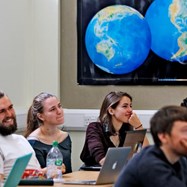Queen Mary academics investigating how to reduce working poverty
The number of employees receiving a living wage has grown enormously over the last decade thanks to dedicated campaigning from London Citizens. Professor Jane Wills at the School of Geography, Queen Mary University of London, has worked alongside London Citizens on the living wage campaign since it was launched in the UK in 2001, when she mapped the extent of low pay in east London, and helped to identify targets for the campaign.
Professor Wills’ research has charted problems faced by poorly paid workers, and explored the way that pay relates to health, educational achievements, parenting, and family life. The research has shown that significant benefits arise from paying the living wage: employers can expect reduced labour turnover, reduced sickness and better service standards, and workers are found to have better psychological health.
Queen Mary is a founding partner in the new Living Wage Foundation, alongside Save the Children, the Resolution Foundation, Trust for London, Linklaters and KPMG. The Foundation provides strategic advice, financial support and endorsement to the idea of the living wage and runs the Living Wage Week and annual Living Wage Awards, hosted by KPMG and the Mayor of London.
Campaigns from London Citizens, which are underpinned by Wills’ research, have led to major corporations such as KPMG, Linklaters, Allen & Overy, Slaughter and May, HSBC and Barclays paying the Living Wage. In addition, many local authorities now make the Living Wage a mandatory element of their procurement policies and all London 2012 Olympic and Paralympic jobs were paid at a Living Wage. London Citizens calculate that the Living Wage campaign has lifted 15,000 low-wage workers out of poverty.
-
Hamir Patel
hamir.patel@russellgroup.ac.uk
020 3816 1316
-
Stephanie Smith
020 3816 1310
 X
X

